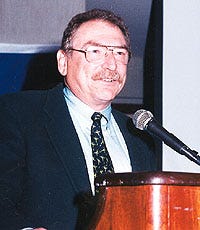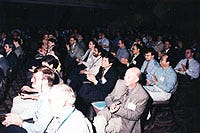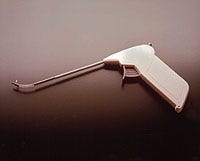Conference Focuses on Medical Laser Technology
March 1, 1998
MPMN Industry News

Conference Focuses on Medical Laser Technology
ICALEO meeting discusses advances in lasers used in medical devices and for device manufacturing
The recent International Congress on Applications of Lasers & Electro-Optics (ICALEO) placed special emphasis on the impact that lasers are having in the medical device industry, both for use in manufacturing and as medical devices.
The conference, held in San Diego and organized by the Orlando-based Laser Institute of America (LIA), began with a keynote address by Michael Berns (pictured above), the president and CEO of the Beckman Laser Institute (Irvine, CA). Berns discussed the use of lasers in medical applications. One wing of the Beckman Laser Institute is devoted to research, while the other uses newly developed laser devices to treat patients. "Delivery systems, miniaturization of systems, and microscale technologies are areas for development," Berns noted. Lasers are being developed for use in diagnosing cancer, determining the depths of burns, and as "laser scissors" and "laser tweezers" to cut and move chromosomes and to fuse cells.
The first day's medical session was titled "Issues in Bringing Laser Technology to Medical Devices Manufacturing." The session's lectures covered such topics as installing lasers, ensuring laser safety, and determining the benefits and costs of bringing a laser into the manufacturing process.
Of particular importance for device manufacturers who are considering using lasers in their manufacturing process was the lecture titled "Making Laser Systems Pay: The Tangible and Intangible Benefits and Costs." William Lawson of Laser Machining Inc. (Somerset, WI) said, "In our experience, it is normal for a company adding a new laser technology to take six months to a year to feel comfortable enough to use the technology they've bought." Lawson said that with good planning and training before installation, most systems will produce good parts at speed in a few weeks. "However, it will take much longer for your entire manufacturing process to be able to function well and to know how to handle normal problems."

Lawson noted that key factors for success include meeting installation requirements, having a schedule for regular preventive maintenance and operators who are committed and well trained, having the early involvement of all personnel and the strong commitment of upper management, and planning enough time to get up to speed rather than expecting instant miracles.
The second day's morning session was focused on laser micromachining, while the afternoon session was concerned with the surgical applications of lasers. Highlights included the lecture by C. Paul Christensen of Potomac Photonics (Lanham, MD), who noted, "The biggest benefits that we see in using lasers for micromachining are that lasers surpass mechanical limits, that they work with difficult materials, and that they allow flexibility in manufacturing." Helen Ward of the Medical Health and Research Centre presented a study that her institution had conducted on treating deep-seated brain tumors with lasers. She said that lasers minimize the damage normally done in brain tumor surgery.
A workshop on the third day was titled "FDA Requirements for Laser Manufacturers." The lecturer, Robert Handren of Handren Associates, related his experiences in working for FDA and later as a regulatory consultant helping device manufacturers. He explained that separate bureaus within FDA regulate medical devices and electronic products that emit radiation. A laser used in medical device manufacturing would have to meet FDA regulations pertaining to lasers and laser systems, whereas a laser used as a medical device would fall under the medical device regulations.
For more information on upcoming LIA events, call 407/380-1553.
Judson A. Smith Doubles Manufacturing Space
Extra space made available for fabrication of miniature tubing
Judson A. Smith Co. (Boyertown, PA) is adding 20,000 sq ft of manufacturing space to its facility. The addition doubles the manufacturing area at the facility, significantly expanding the company's capabilities for the fabrication of miniature tubing.
"We are adding screw machining, laser cutting, and laser welding equipment to the range of services currently offered," says Duane Ottolini, general manager of Judson A. Smith. "This is the first step in a new five-year strategic plan that will continue to advance our efforts in meeting the most complex requirements for highly specialized small-diameter metal tubing and miniature tubing parts."
For more information, contact Judson A. Smith Co. at 610/367-2021.

Product Genesis Wins Design Award
Steerable forceps recognized for design innovation
Product Genesis Inc. (Cambridge, MA), a high-technology product development and engineering firm, has won a contest sponsored by Design News for its design of steerable forceps for Endius Inc. (Plainville, MA). The product design, which allows surgeons to easily remove blockage in the sinus cavity and perform less-invasive surgery, was recognized for its innovation and overall design excellence.
When accepting the award with Product Genesis, Endius CEO Tom Davidson reflected on the strategic product development partnership between the two companies and the challenges the design team overcame. "Product Genesis essentially served as Endius's product development department. The demands were high. As a medical device, the product had to be highly reliable yet cost-effective, and to maneuver in small endoscopic spaces. It had to be both sturdy and flexible."
In Product Genesis's design of the steerable forceps, a stack of injection- molded vertebrae with centrally located pivots provides both the necessary strength and movement. A thumbwheel is used to flex the spine of the device, while the index-finger-controlled trigger moves the jaw of the forceps. The use of injection-molded parts allowed Endius to achieve the necessary target cost for this disposable product, while the simplicity of the design of the main housing helped to keep the manufacturing process efficient and the parts count low.
For more information, contact Product Genesis Inc. at 617/661-3552.
Zevex Receives EN 46001 Certification
Allows company access to sell and distribute products in Europe
Zevex International Inc. (Murray, UT) announced that it has received EN 46001 certification from the National Standards Association of Ireland. The EN 46001 designation goes beyond ISO 9001 requirements, allowing a medical device company to perform its own CE testing and marking.
"The EEC applies stringent quality requirements to designated medical device manufacturers," said Dean Constantine, Zevex's president and CEO. "To achieve this designation, we have had to demonstrate a continuing commitment to quality management and an ability to be self-regulating."
Zevex designs and manufactures medical devices such as surgical systems, device components, and sensors for medical technology companies. It also designs, manufactures, and markets its own medical devices using proprietary technologies.
For more information, call Zevex at 801/264-1001.
You May Also Like

.png?width=300&auto=webp&quality=80&disable=upscale)
